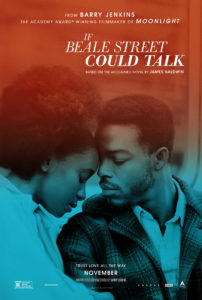 If Beale Street Could Talk is a beautiful series of vignettes that tell the story of a young black couple in the early 70s in New York. Directed by Barry Jenkins (Moonlight), this adaptation of James Baldwin’s novel is a racial justice story wrapped in a love story that is uplifting and heartbreaking at the same time. At the center are Tish (KiKi Layne) and Fonny (Stephan James – Race, Selma), young lovers just starting their lives together when their world is upended with a false rape allegation. And it’s through a family’s love that things don’t entirely fall apart.
If Beale Street Could Talk is a beautiful series of vignettes that tell the story of a young black couple in the early 70s in New York. Directed by Barry Jenkins (Moonlight), this adaptation of James Baldwin’s novel is a racial justice story wrapped in a love story that is uplifting and heartbreaking at the same time. At the center are Tish (KiKi Layne) and Fonny (Stephan James – Race, Selma), young lovers just starting their lives together when their world is upended with a false rape allegation. And it’s through a family’s love that things don’t entirely fall apart.
Fonny and Tish have known one another since childhood and falling in love is a natural extension of their relationship. Their courtship is as normal as it can be when they’re reminded again and again of their otherness. Apartments aren’t available to them. A racist cop tries unfairly to blame Fonny for a fight and later frames him for a rape he didn’t commit. And after Fonny is in jail, Tish finds out she’s pregnant. And it is Tish’s family who rallies to prove his innocence against a thoroughly racist system. Tish’s mom (played by the amazing Regina King) even travels to Puerto Rico to try to talk the rape victim into recanting in a staggeringly emotional scene.
If Beale Street Could Talk is not a perfect movie, not on the same level as Jenkin’s previous film Moonlight. It’s a bit too long and somewhat too languid. And the story jumps around in time a bit too much for my taste. But it is worth seeing. It’s gorgeously shot with great performances. And it’s a velvety take on racism that sadly is still too relevant. I’d recommend it to people looking for a drama with heart.
[Mainstream Chick’s take: I agree with all of Arty Chick’s points on this one. If Beale Street Could Talk is very good, but it’s got quite a bit of similar-themed material to compete with this year. It joins a crowd of other good films dealing with race relations, civil rights, etc. (including BlackKKlansman, Sorry to Bother You, and my favorite – Blindspotting.) It’s got a vibe that will entrance some moviegoers while leaving others feeling a tad underwhelmed. The former (more enthusiastic viewers) will likely be more familiar with James Baldwin, the writer of the source material and the subject of last year’s excellent documentary, I Am Not Your Negro. Others may be surprised to discover the film takes place in Harlem – not on Beale Street in Memphis (the point being that the African-American experience depicted in the film plays out on streets and communities across America). If Beale Street Could Talk is at once captivating and heartbreaking, sometimes funny and sometimes sad. A mixed bag of emotions that will, in the end, leave you feeling somewhat melancholy and more than a little distressed about flaws in our social and justice systems, past and present. – hb]
